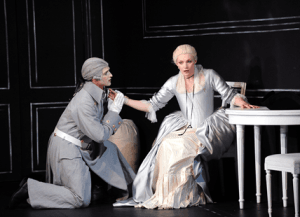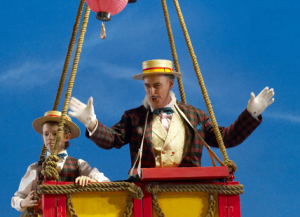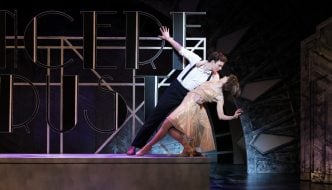Preview: Opera North’s Winter season
December 24, 2015
 For Opera devotees in these parts, Opera North’s continuous oversight in omitting Andrea Chénier, Umberto Giordano’s principal claim to fame, from its schedules, means that we are far more familiar with the work of its librettist, Luigi Illica (Manon Lescaut, La Bohème, Tosca, Madama Butterfly) than we are of its composer. Illica seems to have been the verismo musician’s wordsmith of choice in the 1890s. Partly because, as a respected playwright, he proved repeatedly that he could bring an unerring sense for the dramatic to any stage. But he also seemed to have lived the life, having, as a journalist, lost an ear in a duel over a woman.
For Opera devotees in these parts, Opera North’s continuous oversight in omitting Andrea Chénier, Umberto Giordano’s principal claim to fame, from its schedules, means that we are far more familiar with the work of its librettist, Luigi Illica (Manon Lescaut, La Bohème, Tosca, Madama Butterfly) than we are of its composer. Illica seems to have been the verismo musician’s wordsmith of choice in the 1890s. Partly because, as a respected playwright, he proved repeatedly that he could bring an unerring sense for the dramatic to any stage. But he also seemed to have lived the life, having, as a journalist, lost an ear in a duel over a woman.
Of course, the opera’s overdue appearance at Leeds Grand Theatre is no reflection of the work’s merit. Andrea Chénier was premiered at La Scala. Mahler conducted it in Hamburg within the year and it was championed on record in its early infancy by the likes of Caruso and Boninsegna. The plot is based, loosely, on the life of a French poet at the time of the 1789 French Revolution and the subsequent Terror. Unlike Puccini, who regularly sacrificed his heroines so that his heroes might live, sometimes, nothing more than a more palatable life, Giordano oversees both hero and heroine perishing at the guillotine.
In addition to four wonderful arias and ariosos for the principal tenor (Un dì all’azzurro spazio; Io non amato ancor; Si, fui soldato; and, Come un bel dì di maggio), the opera contains the impassioned, initially falteringly choked spinto aria (La mamma morta) for the soprano heroine. This latter piece, with Callas singing, got included in the soundtrack for the 1993 Tom Hanks film Philadelphia. Also noteworthy are the baritone’s expressive monologue Nemico della Patria and the final, cataclysmic soprano-tenor duet, an extraordinarily fevered declaration of undying love for the two leads as they prepare to face their ultimate fate.
This belated, and, therefore, all the more welcome, production of Andrea Chénier, is directed by Annabel Arden, who has given us memorable productions of La Traviata, The Magic Flute and The Cunning Little Vixen. Rafael Rojas and Robert Hayward, who squared up to each other in the company’s recent The Girl of the Golden West, and Annemarie Kremer, ON’s Norma in 2012, take the vocal leads.

Così fan tutte (2009) Photo credit: Tristram Kenton
The rest of the 2016 Winter Season is tried and trusted box office. Mozart’s languid look at love, Così Fan Tutte, suffered its own egregious neglect in its day. First performed in Vienna in 1790, it did not reach the New York Met until 1922. Tim Albery’s celebrated 2004 take for Opera North has the cast – mainly the two sisters, Fiordiligi and Dorabella, and their respective swains, Guglielmo and Ferrando – encased in a prototype-looking Kodak Box Brownie. It captures their reflections on devotion and artifice, fidelity and deceit, real love and feigned emotion.
Mozart’s musical score enriches the operatic repertoire with a gorgeous, enlightened stream of many of its most beautiful vocal ensemble pieces. Some with all six characters involved, without leaving out glowing outlets for the individual principals. As usual with the operas of this composer, who knew the human voice with all its capabilities and limitations, it is both rewarding and a challenge to sing.
Lorenzo da Ponte’s libretto provided Mozart with the required comic lightness suffused with the occasional profound insightfulness. As a visual sideline, it is said that, for the premiere, Mozart had taken a dislike to the Fiordiligi, one Adrianna Ferrarese del Bene, who happened to be Da Ponte’s rather affected mistress. Exploiting her irritating tendency to drop her chin on low notes and throw back her head on high ones, the composer filled her showpiece aria Come scoglio – “Like A Rock” – with a succession of acrobatic vocal leaps so as to make the good lady’s head “bob like a chicken” onstage. In an age when the composer served the diva, rather than the modern reverse, it was perhaps a forgivable act of retribution.

L’elisir d’amore (2007) Photo credit: Richard Moran
Daniel Slater’s 2000 production takes Fellini as its model and transplants Donizetti’s L’Elisir D’Amore into a gloriously sunny cappuccino-fumed 1950s hotel setting, complete with Vespa and a hot-air balloon. Its hero, the hapless, but genuine Nemorino, has his heart set on the wordly, but capricious Adina. There are three big duets between them and, when the fabled love potion, desperately acquired using all his savings, seems to work, Nemorino opens out with his radiant Act II romanza Una Furtiva Lagrima. However, think it possible that his sudden attraction to women may not be down to magic and chemistry after all. Jung Soo Yun, the company’s Macduff in Verdi’s Macbeth and Garbiela Istoc, the tragic Mimi in La Bohème, both from 2014, head a cast of recent regulars.
For more information visit the Opera North website.
Filed under: Theatre & Dance
Tagged with: Andrea Chénier, Cosi fan tutte, L'elisir d'amore, leeds grand theatre, opera north, Tom Tollett



Comments